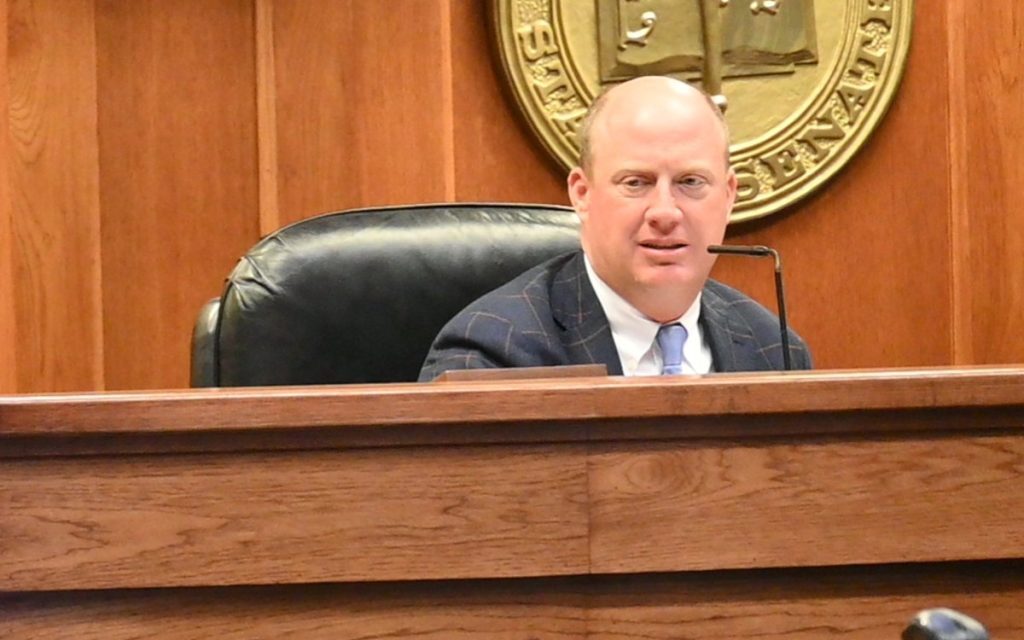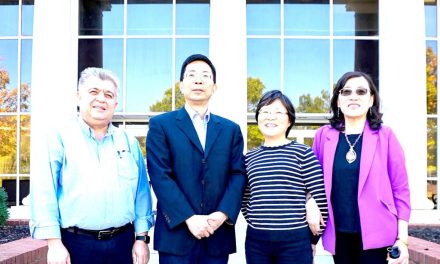By Mike Cason
Alabama Lt. Gov. Will Ainsworth has not decided if he will be on the ballot for governor in 2026 but is sure that he will either run for the state’s top office or go back to the private sector.
Ainsworth, a Republican from Marshall County, is in his second term as lieutenant governor and barred by term limits from seeking a third.
Alabama’s race for governor in two years is wide open because Gov. Kay Ivey is also term-limited.
“The only position I’d have an interest in running for when my time is up, and I am term-limited, would be governor,” Ainsworth said. “And so, I’ll either run for governor or go back to the private sector. I imagine I will make a decision on that sometime (around) the beginning of next year, probably February or March, something like that, about what I’m going to do.”
The 2026 primary will be May 26, the day after Memorial Day. Candidates can begin raising money one year before the election.
“So it would be in May (2025) when the campaign would start,” Ainsworth said. “But right now, just focused on doing my job as lieutenant governor, and then try to make a decision with the family on if we want to run for governor or not sometime the first part of next year.”
With the start of the fundraising period still almost 10 months away, no candidates have announced they will run.
Rick Pate, commissioner of the Alabama Department of Agriculture and Industries, who is also term-limited, said he would talk to his wife next year about the possibility of a run for governor, although he said he is not discussing the idea or making any plans before then.
“Julie and I certainly need to have that discussion with our boys and pray about it,” Pate said. “A lot goes into that.”
“We just made a conscious decision we wouldn’t talk about it or think about it until next year,” Pate said. “This is really a full-time job I’m in now and takes a lot of my attention and it’s fun. I want to give this job my very best.”
Ainsworth was elected lieutenant governor in 2018 and reelected in 2022. Before that, he served one term in the Alabama House of Representatives, representing Marshall County, where he has lived since his family moved from Homewood when he was 1.
“Right now I’m focused on being lieutenant governor and trying to be most active and best lieutenant governor our state’s had,” Ainsworth said. “We’ve worked hard on military issues, on workforce development, on recruiting industry to our state, on education issues. Going to continue to do that.”
Ainsworth is a husband, father, and business owner with a marketing degree from Auburn University. He says family comes first as he weighs his decision.
“I’ve got twin boys that just started ninth grade today (Thursday),” Ainsworth said in an interview with AL.com. “I’ve got a daughter that is starting seventh. And obviously family is an important priority, and their schedules.”
Ainsworth said his children are involved in sports and that making time for them and their activities is a priority.
“But I think at the end of the day, our family is committed to public service,” Ainsworth said. “They understand that. But also, my first priority is to make sure I’m a good dad, involved in their lives as well. But I think certainly you can do both.”
As lieutenant governor, Ainsworth presides over the state Senate. Although his role does not involve sponsoring or voting on bills, he has promoted legislation that benefits military families, such as bills to help spouses of service members pursue their careers in Alabama by streamlining reciprocity of professional licenses.
Ainsworth led a task force that helped develop legislation intended to increase Alabama’s low workforce participation rate, bills that passed with broad bipartisan support. They included bills to create a new career tech high school diploma for students not going to college and to create tax credits to promote affordable housing and child care.
Ainsworth was a proponent of the reduction in the state sales tax on food that lawmakers passed in 2023.
One of the issues Ainsworth has been most outspoken about is the need to widen Interstate 65 from Tennessee to Mobile. On that topic, he has some some conflict with the Ivey administration, which supports widening I-65 while also championing an initiative to widen U.S. 43 to establish a north-south corridor in west Alabama. Ainsworth said the focus needs to be on I-65. Ivey has said it’s not an “either-or” proposition.
Former President Trump pledged his support for the I-65 expansion when he spoke at a Republican Party fundraiser in Alabama a year ago.
“I think I-65 is the No. 1 infrastructure project in our state,” Ainsworth said. “Fortunately, Gov. Ivey has already started in some areas of 65 that have some of the highest traffic rates, widening 65. My vision and plan for 65 that I’ve talked about – and we’re going to continue to push until we get it done – is from the state line in Tennessee, to Mobile, to have six lanes, three both directions. I think it’s got to get done. I think it should have been done years ago. And it’s something that’s just a bottleneck.
“You look at eight million visitors coming in to the coast every year and traveling our interstates. You look at it being our main artery. You talk about interstate commerce and us getting our goods to wherever they need to go. We’ve got to make sure that happens.”
Ainsworth estimates it would take about 10 years to make I-65 six lanes along its full route. He said federal funds would provide 80% of the cost, a standard match in federal highway projects.
As for the top overall priority for the next governor, Ainsworth said it will be continuing efforts to improve education and aligning it with the changing needs of the economy.
“We’ve got to do a great job of continuing to compete with not only other states but other countries,” Ainsworth said. “Making sure our students are receiving the best education. If we’re talking about the workforce side, that they’re trained.”
Ainsworth said the state must continue to adjust to economic demands that call for an educational emphasis on science, technology, engineering, and math, or STEM.
“I think we’ve done a lot of things well,” Ainsworth said. “There are things we’ve got to continue to improve on. But I think education has always got to be your top priority, and is certainly going to be a challenge. But I think it’s a challenge we can meet.”
Ainsworth said he supports allowing Alabama voters to decide whether to approve a state lottery but does not say he will take an active role in trying to get gambling legislation through the Legislature. Alabama voters last had their say on a lottery in 1999.
Ivey supported a plan to allow voters to decide whether to establish a lottery, state-regulated casinos, and legal sports betting, as well as a statewide gambling commission to curb illegal gambling operations. That plan passed the Alabama House this year. But a compromise version fell one vote short in the Senate, continuing decades of futility in trying to resolve the issue.
Ainsworth said governors do not not have to be directly involved in major gambling bills because they require a constitutional amendment that gives voters the final say.
“Really, the only issue on gambling I have people contact me about is the lottery,” Ainsworth said. “That people want the lottery – I hear that all over the state. And I’ve always had the position I have no problem letting people vote on the lottery.
“As lieutenant governor now, or if I decided to run for governor, I don’t really have any impact on that because that’s a constitutional amendment that the people would vote on. But I’m certainly in favor of letting people vote on a lottery. I’ve never had an issue with that. You can make the argument and it certainly makes a lot of sense when you look at the amount of people that are going outside of our state to buy lottery tickets.”











